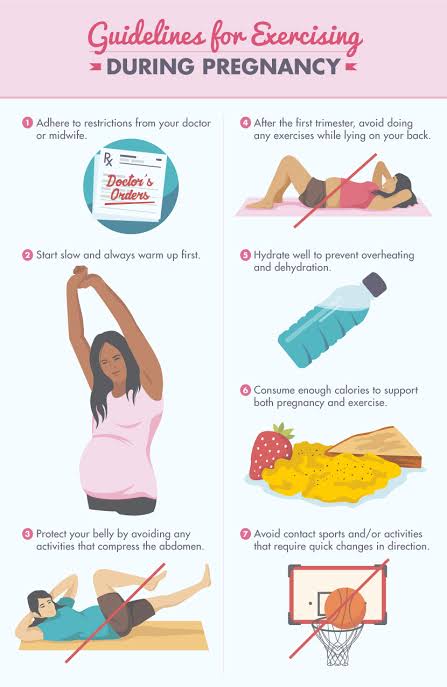
Exercises You Can Do While Pregnant
Note: This article has been written for general information purposes and does not constitute expert advice. We recommend that you consult your obstetrician for the healthiest information about pregnancy.
Maintaining a regular exercise routine throughout your pregnancy will help you both stay healthy and cope with the physical changes that come with pregnancy. Regular exercise is very effective in reducing discomfort during pregnancy and accelerating the postpartum recovery process. Unless you’re experiencing complications that prevent you from exercising, you can do at least 30 minutes of moderate-intensity exercise most days, if not all, of the week.
Benefits of Regular Exercise During Pregnancy
It reduces stress and increases your energy.It reduces your back and waist pain and swelling in the body.It improves your sleep quality.It reduces the complaints of depression and anxiety by increasing the level of serotonin.It prevents excessive weight gain.Supports muscle strength and endurance.It reduces the risk of pregnancy complications such as gestational diabetes and preeclampsia.Prepares for birth, helps to reduce the risk of premature and cesarean delivery.It increases the rate of postpartum recovery.
What Exercises Can You Do During Pregnancy?
Exercising during pregnancy is mostly safe. But before you start exercising regularly, you should get your obstetrician’s approval. Exercises that women who have a healthy pregnancy can do include:
Walk
Light walking is a great option for pregnant women who are new to exercise and want to improve their fitness. It also has a positive effect on the development of the baby in terms of accelerating blood flow and increasing the oxygen level in the blood. 30-minute walks 3 or 4 days a week are ideal. During the walk, care should be taken not to sweat excessively and to breathe through the nose and out through the mouth regularly.
Swimming
Swimming and water exercises are a safe option in terms of supporting your increased body weight and working your joints and muscles. In addition, swimming helps to reduce complaints such as back and lower back pain. Balances weight gain. Be careful not to push yourself too hard while swimming. 30 minutes of swimming time per day is ideal. Another thing to consider is that the pool is not over-chlorinated and hygienic.
Yoga and Pilates
Prenatal yoga and pilates classes designed for pregnant women are exercises that you can continue until birth, while benefiting your whole body. These exercises make it easier to adapt to physical changes during pregnancy and improve breathing control. Both exercises help increase body flexibility and endurance, strengthen muscles and facilitate childbirth. It allows you to relax both mentally and physically.
Indoor Cycle
Cycling and low-dose aerobic exercises are also considered safe for pregnant women by experts. The stationary bike is a much safer option for pregnant women, reducing the risk of falling. It helps you stay in shape and strengthen your leg muscles. Low-dose aerobic exercises will help you control your weight gain and support your cardiovascular health.
Kegel Exercises
Kegel exercises, also known as pelvic floor exercises, provide strengthening by tightening and loosening the muscles that support the uterus, bladder and intestines. Thus, thanks to these exercises during pregnancy, birth becomes easier. It also helps you prevent health problems such as postpartum urinary incontinence and hemorrhoids. You can do this exercise by squeezing the pelvic floor muscles for 3-10 seconds and then relaxing them, 3 times a day for 10 repetitions in each session.
It is very important to warm up and cool down after all the exercises you will do during pregnancy. Avoid doing strenuous exercises that make you gasp while talking. Make sure to drink plenty of water and fluids.
Avoid These Exercises During Pregnancy!
Exercises with a risk of falling, such as horse riding, cyclingContact sports such as football, basketball and volleyballExercises that require jumping, jumping, jumping or runningExercises that require you to lift heavyExercises that require you to lie on your back after the first trimesterSports such as skydiving, surfing and scuba divingExercising at high altitudeexercising in hot weather
When should you stop exercising?
Listening to your body is as important as exercising regularly during pregnancy, both for your own health and for the health of your baby. If you have any of the following symptoms, you should stop exercising and contact your obstetrician.

Vaginal bleeding or leakage of fluid from the vaginaRegular, painful uterine contractionsshortness of breath, chest painfast or irregular heartbeatHeadacheDizziness or feeling faintmuscle weaknessCalf pain or swelling